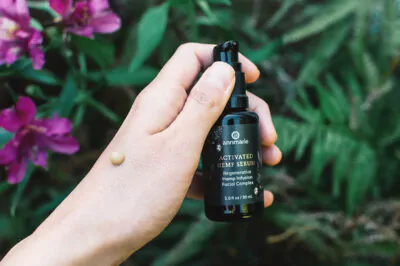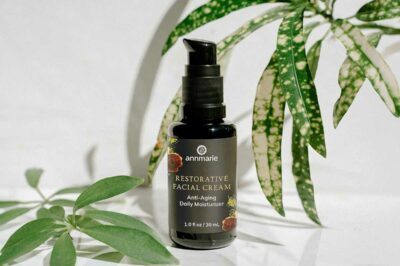Table of Contents[Hide][Show]
- 10 Reasons Why You Should Spend More Time Outdoors
- 1. Indoor Air Pollution is Worse than Outdoor
- 2. Your Stress Levels Will Go Down
- 3. It’s Better For Your Eyes
- 4. It’s the Best Way to Get Some Vitamin D
- 5. It Will Help You Sleep
- 6. It Will Get You Moving
- 7. You’ll Improve Your Attention and Memory
- 8. You’ll Have More Energy
- 9. You’ll Feel Happier
- 10. You’ll Boost Your Immune System
Most of us these days live a fast-paced, technology-packed lifestyle. Between work, the commute, taking care of the kids, cooking and cleaning, watching television, connecting on social media, and more, we’re spending an average of 90 percent of our time indoors.
That would have been nearly unheard of a mere 50 years ago.
Unfortunately, all this indoor time is having a negative impact on our health—and on our children’s health.
It’s time we unplugged and stepped outside. And always remember to apply enough outdoor skincare products to protect your skin.
Forest Bathing 101: What is it and the 6 Benefits for Your Body
10 Reasons Why You Should Spend More Time Outdoors
Just in case you need a little motivation. Here are 10 very important reasons why putting “outdoor time” on your calendar is critical to your health and wellbeing!
1. Indoor Air Pollution is Worse than Outdoor
You may think that you’re safe little home is much better for you than the big wide world, but it’s not so, according to the Environmental Protection Agency (EPA). Studies have found that the concentration of some pollutants is often two-to-five times—and sometimes more than 100 times—higher indoors than outdoors.
The California Air Resources Board also estimated that indoor air pollutant levels are 25-62 percent higher than outdoor levels.
Worse, the most common indoor pollutants have been ranked among the top five environmental risks to public health.
Indoors, you’re exposed to things like carbon monoxide and particulate matter from things like fireplaces and cooking appliances, as well as a number of other chemicals, including volatile organic compounds (VOCs), formaldehyde and flame retardants. Chemicals from furnishings, building materials, household and office products, and more can emit particles into the air, and don’t forget mold, dirt, dust, and pet dander.
Increasing ventilation will help, but it’s best for your health to get outside a little bit every day. If you’re experiencing symptoms like burning eyes, breathing problems, scratchy throat, headaches, brain fog, and fatigue, you’re probably spending too much time breathing indoor air.
2. Your Stress Levels Will Go Down
You’ve probably already experienced this. If you’re stressed out at home or in the office, it’s amazing what a quick walk outside can do for you.
Science backs up this experience. A 2009 study found that after taking nature walks, people reported lower levels of stress. A 2013 study reported that taking a walk in a green area can put the brain in a meditative state, with results so profound they showed up on EEG (electroencephalography) recordings.
Add a few trees in the mix and you’ll feel even better. These were the findings from a 2010 study, which found that “forest bathing”—the practice of walking through the forest—reduced levels of the stress hormone “cortisol” in the blood, and decreased stress and anxiety. It also reduced blood pressure and heart rate, as well as fatigue and improved mood.
3. It’s Better For Your Eyes
You probably already know that all those hours staring at the screen are bad for your eyes. But scientists recently reported that particularly for children, too much time indoors can create irreversible changes in the eyes.
A number of studies have linked time indoors with incidence of myopia, or nearsightedness, in children. In 2012, researchers assessed children at ages 7, 10, 11, 12, and 15 years and found that those who spent more time outdoors were less likely to develop myopia.
An earlier 2007 Australian study found similar results—children who spent more time outside were less likely to have myopia. More indoor time, on the other hand, was associated with greater rates of myopia in a related 2013 study.
Time outdoors is also good for adult eyes. The more time we spend with the screen, the more likely we are to suffer dry eye syndrome. Letting the eyes focus on something more distant exercises different muscles and allows the eyes to relax and recover.
4. It’s the Best Way to Get Some Vitamin D
Many of us are not getting enough vitamin D—probably because we’re spending so much time indoors. It’s gotten so concerning that in 2008, researchers reported that vitamin D deficiency “is now recognized as a pandemic.”
The reason according to scientists? We’re not getting enough sunlight, and the foods we eat that naturally contain vitamin D don’t contain enough to satisfy optimal requirements.
In 2009, researchers reported that three-quarters of Americans were coming up short on vitamin D, and that African Americans were particularly low.
Meanwhile, low levels of vitamin D have been tied to an increased risk of cardiovascular disease, cancer, Alzheimer’s disease, depression, hip fractures, and pregnancy complications.
Your body’s best source of vitamin D is the sun. Try to get at least 15 minutes of direct sun exposure on your skin every day. (You can also take a daily D3 supplement of 600-800 IUs.)
5. It Will Help You Sleep
How well you sleep has a lot to do with hormones like melatonin and your own natural circadian rhythm. Both of these are affected by your exposure to light—sunlight, most of all. If you’re spending too much time indoors, you’re isolated from the source of your body’s natural rhythms, and your sleep cycle is likely to suffer.
A study out of the St. Louis University School of Medicine, for example, noted that natural sunlight helps set our body’s internal clocks, and that people need to get about 30-60 minutes of exposure to direct sunlight for sleep patterns to improve. Nursing home residents who were suffering from insomnia were exposed to natural light, after which they had less difficulty falling asleep and experienced fewer episodes of nighttime wakefulness.
A later 2013 study found similar results. Day-shift office workers who were having trouble sleeping were exposed to more natural light during the day. The result was a more restful sleep at night.
6. It Will Get You Moving
When we go outside, we naturally move more. It seems to come with the territory. According to the study above on sunlight and sleep, workers who got more sun also tended to be more physically active.
Studies have also found that those who run or bike outside exert more energy and burn more calories than those who use treadmills or stationary bikes. Other studies have found that people enjoy exercising outdoors more and are therefore to do it for longer—again, burning more calories.
7. You’ll Improve Your Attention and Memory
Having a hard time concentrating? Get outside for a few minutes.
Just a little fresh air and sunshine can help increase your attention span. Researchers from the University of Illinois evaluated 17 children with attention deficit hyperactivity disorder (ADHD), before and after taking a 20-minute walk in the park. Children were better able to focus after the walks in “green areas,” as opposed to walks in other settings.
“Doses of nature might serve as a safe, inexpensive, widely accessible new tool in the tool kit for managing ADHD symptoms,” researchers wrote.
Another study from the University of Michigan found similar results, though this time on adults. Researchers found that interacting with nature, such as walking in the park, helped improve memory and attention, no matter what the season. Short-term memory improved by 20 percent!
8. You’ll Have More Energy
A 2010 study also found that those who walked outside reported higher levels of vitality. “Nature is fuel for the soul,” said lead author Richard Ryan. “Often when we feel depleted we reach for a cup of coffee, but research suggests a better way to get energized is to connect with nature.”
Other studies have shown that the presence of nature helps ward off feelings of exhaustion, and that 90 percent of people report increased energy when they’re enjoying outdoor activities.
9. You’ll Feel Happier
Time outside benefits your mental wellbeing, according to scientists. It naturally boosts levels of serotonin in the brain—the “feel good” neurotransmitter. In a 2002 study, scientists measured serotonin levels in a group of 101 healthy men during each of the four seasons, and found that regardless of the season, the level of serotonin in the brain was affected by the amount of sunlight on any given day.
Another recent study found that groups of participants who took walks in nature experienced reduced symptoms of depression and enhanced mental well being.
“Our findings suggest that something as simple as joining an outdoor walking group may not only improve someone’s daily positive emotions,” said study author Sara Warber, “but may also contribute to a non-pharmacological approach to serious conditions like depression.”
10. You’ll Boost Your Immune System
In the study mentioned above on “forest bathing,” and in a follow-up study on the same practice, researchers found that participants walking among the trees boosted their immune systems. More specifically, after the participants inhaled the natural “phytoncides” in the air—particles of a-pinene and limonene from the wood of the forest trees—their blood tests showed increased activity of natural killer cells.
What was amazing was that the effects of increased immune function were still there 30 days after the walk!
It’s clear that nature is in our blood. Do yourself a favor this week and hit the great outdoors!
Sources
EPA – Indoor Air Quality
CPSC – Indoor Air Pollution: Introduction for Health Professionals”
Sunyhoung Kim & Eric Paulos – inAir: Sharing Indoor Air Quality Measurements and Visualizations
St. Louis University – Link Between Sleep Quality and Natural Sunlight Explored in Saint Louis University Geriatric Study
Forbes – To Get More Sleep, Get More Sunlight
Journal of Sports Sciences – A 1% Treadmill Grade Most Accurately Reflects the Energetic Cost of Outdoor Running
Journal of Sports Sciences – The Ecological Validity of Laboratory Cycling: Does Body Size Explain the Difference Between Laboratory- and Field-based Cycling Performance?
Environmental Science and Technology – Does Participating in Physical Activity in Outdoor Natural Rnvironments Have a Greater Effect on Physical and Mental Wellbeing than Physical Activity Indoors? A Systematic Review
International Journal of Behavioral Nutrition and Physical Acticity – Outdoor Physical Activity and Self Rated Health in Older Adults Living in Two Regions of the U.S.
The American Journal of Clinical Nutrition – Vitamin D Deficiency: a Worldwide Problem with Health Consequences
JAMA Internal Medicine – Demographic Differences and Trends of Vitamin D Insufficiency in the U.S. Population
Investigative Ophthalmology & Visual Science – Time Outdoors and Physical Activity as Predictors of Incident Myopia in Childhood: a Prospective Cochort Study
Ophthalmology – Outdoor Activity Reduces the Prevalence of Myopia in Children
Ophthalmology – Outdoor Activity and Myopia Among Primary Students in Rural and Urban Regions of Beijing
Ecopsychology – Examining Group Walks in Nature and Multiple Aspects of Well-Being: A Large-Scale Study
The Huffington Post – Taking a Walk in Nature Could be the Best Thing You Can Do for Your Mood All Day
Journal of Attention Disorders – Children with Attention Deficits Concentrate Better After Walk in the Park







